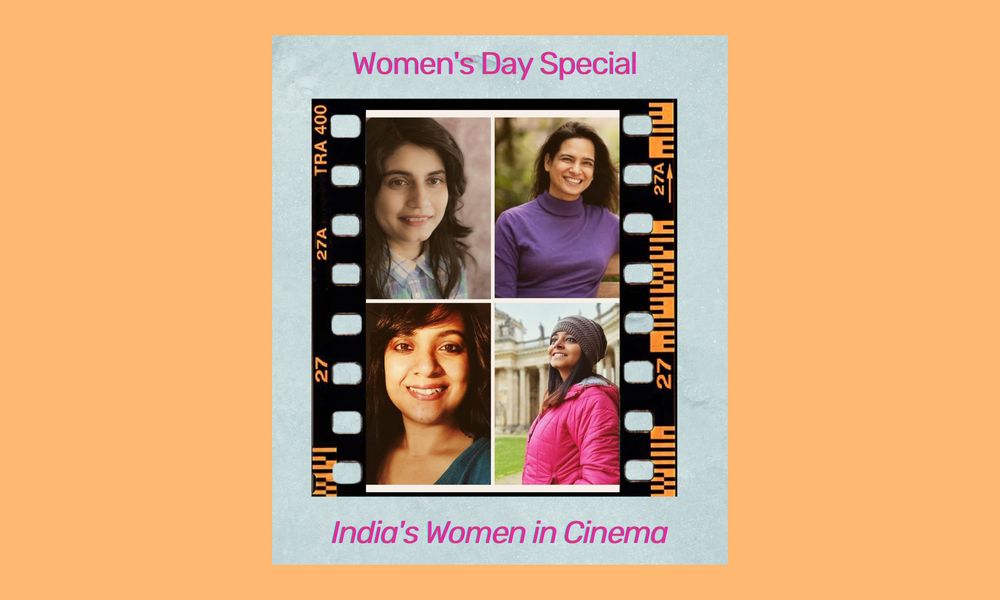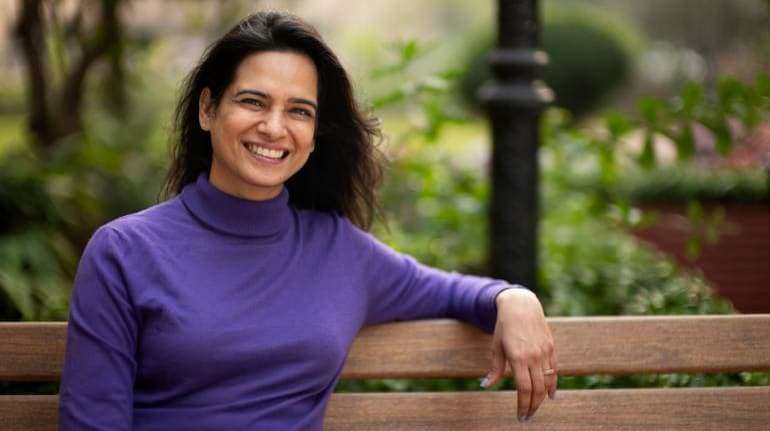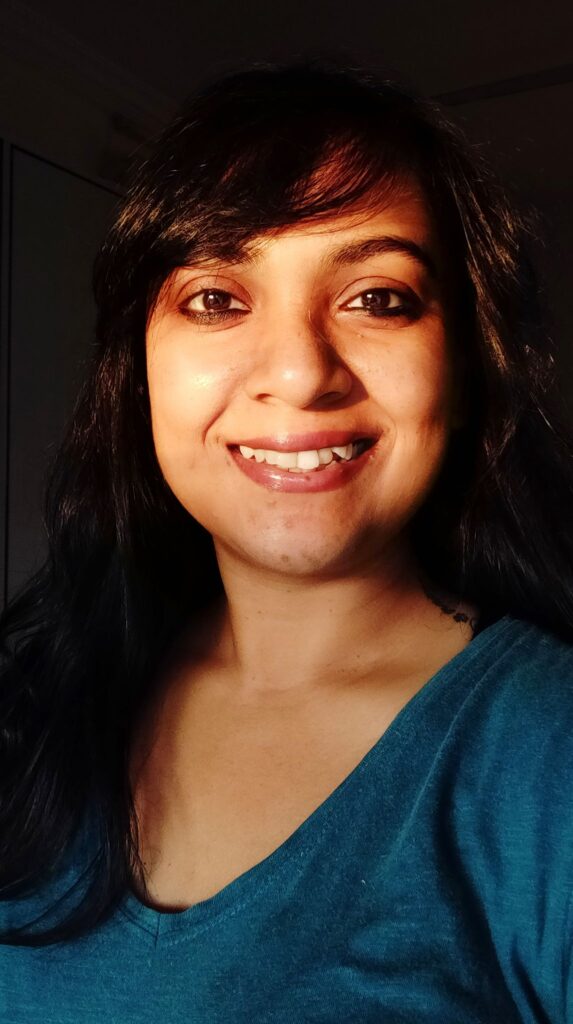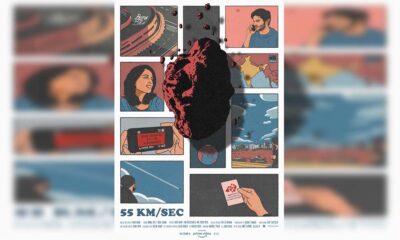Exclusives
Women’s Day Exclusive: Female Directors, Cinematographers and OTT Content Heads on challenges and the future
On Women’s Day, CineBlitz speaks to Arati Kadav, Priyanka Ghose, Nimisha Pandey and Modhura Palit on women in films.
Published
1 year agoon
By
CB Desk
By Shweta Parande
Women directors and crew members were a rarity rather than a norm just a couple of decades ago, when things slowly started to change. From the early 2000s, more and more women took charge of their lives and careers. Like in many corporate sectors, we also saw Bollywood and other entertainment industries being open to having more women on board. Soon these women became the experienced professionals of the future and also mentored protégées. Today, females are confident enough to direct their first film or web series at a young age, or head the direction team or technicians, or be the cinematographer.
As we celebrate Women’s Day, in a CineBlitz Exclusive, we speak to the new breed of women directors in Bollywood, Arati Kadav and Priyanka Ghose, to cinematographer Modhura Palit, and Zee5 Chief Content Officer Nimisha Pandey, on the challenges they have faced, the current scenario and the future of women in the industry.
Arati Kadav, Filmmaker (Cargo, The Great Indian Kitchen Hindi remake)

What are the challenges faced by women in the film industry? Did you face any and what were they?
The biggest challenge is finding your first break. A lot of times, the road is longer and more winding for women directors. I had to make eight short films that went to many festivals and also bootstrap my first feature. The road gets better but it is a path that tests you and as artists sometimes makes you go through a sense of “being on your own”. I feel finding your crew/friends and your tribe is important. We become better team managers in the process.
Do we still have a long way to go or is it easier now for women filmmakers thanks to more doors opening up?
We have a massively long way to go if we just look at the statistics. There are a handful of women spotlighted and celebrated by lots of platforms but in the backdrop, there are many other women not getting equal opportunity and chances. The need for “greenwashing” to show that crew and the writers’ room have women helps but the desire for that balance by very few production houses is intrinsic.
More and more female directors, writers and crew members are being nominated for awards. Is this a good sign?
Yes, it’s a good sign but we shouldn’t celebrate yet. We are far from being on equal footing to men. Very few women have crossed the barrier and made truly mainstream films. Until the time comes that 60-70 percent of mainstream films are being directed by women and have a good number of women HoDs (heads of departments), we should not celebrate.
Nimisha Pandey, Chief Content Officer, Hindi Originals – Zee5

What are the challenges faced by women in the film industry?
There are many challenges. I am very often still the only woman in the decision-making room. But I’m happy that at least we’ve come this long…but we (still) have a very long way to go. We need more women on the set in every department. We are making focused efforts to bring in more women technicians, more women HoDs. What I am cheering for and championing is that there are enough women in the decision-making positions in corporate houses. Unless there are women in those rooms where you are deciding on the stories, on what the characters are going to be like – that narrative is never going to be balanced. This is in addition to the efforts to bring in a balanced crew on set. I am actively working towards changing the other side (corporate side) as well.
As a corporate professional, that in itself is challenging and not an easy thing to do. It is commendable.
It’s not an easy thing but then that has never stopped women (smiles). Of course, there are a lot of women overall in the workforce. But as you go up the pyramid, as you go higher in the corporate structure, the C-suite, there are fewer women. That’s a longer and larger conversation, but that’s what we really need to work on and change.
So are there more challenges in the corporate setup than on the field / on set? Are there more women on the field in entertainment?
No, I am saying that everything needs to be worked on together. You cannot change the overall scenario by changing only one part. It’s not either / or. The reason I am bringing this up is because there are a lot of conversations about women on the floor. I feel that more conversations should happen about how women should be in boardrooms. Not at the cost of one another, but both should happen. And don’t do it as a token or because that’s the right thing to do.
Modhura Palit, Cinematographer, Naxalbari; Cannes award winner

What challenges did you face as a woman cinematographer?
All women face the same difficulty when starting out. It doesn’t matter which job she will be going for. I faced the same – the acceptability by the people to believe there is a girl who is a cinematographer, and who they could believe can deliver. It was their mindset which stopped them from believing in me. The struggle was to be taken seriously by them.
Is it easier for women DoPs now, with more in the fray? Or is it still difficult to get a job and convince people that you can do it?
It is a little easier now because women DOPs are now making their mark already and getting their work showcased. Though at an individual level it still might be difficult. But the acceptability is high. It’s not completely surprising anymore.
More women directors, writers and crew members are being nominated and getting awards internationally. Is this a good sign and what does the future hold?
Of course, it’s a great sign. It means the community can grow and help motivate other women to join films. Also, it can give hope to all the girls out there to join the industry and follow their dreams. It has also helped to diminish the gender gap. So, more accolades will only help to build the community.
Priyanka Ghose, Director (The Night Manager, Broken But Beautiful 3)

Did you face any challenges? Did you have any support from men on the sets?
Like any other industry, of course, it is tough for women to rise to positions of power. Having said that, sometimes you get lucky and can surround yourself with men who are actually there to support you! To be honest, yes, it has been hard to survive and thrive in a male-dominated industry and world…and it takes a lot to keep persevering and never give up!
I started out as an assistant director (AD) 15 years ago. It was tough when I became the First AD (second in command to the director, who is handling the daily logistics of a shoot) on films, where people needed to take instructions from me – it’s like you are fighting a mindset more than anything else! Back in those days, there were fewer girls in any film crew – so we did feel like a minority. Yet, there were men who would always support you and then there were people who weren’t very comfortable taking instructions from you.
Is it easy for women to manage work and home, considering the hours and dedication required? How has it been for you?
Gradually, I have seen an exponential rise in the number of female crew members, which is very encouraging. One realises that it’s not just on the work front, but also at the home front, more and more girls are being able to have their own voice and follow their dreams and passions. Personally, the home front has always been sorted since my family has been more than supportive of whatever I chose to do. It was at the work front that it took way longer than my male peers to get to any position of power.
Also read: Exclusive: “Smile nahin, laugh-please kaho,” insisted ‘dum-a-dum-mast-‘Calendar’ Satish Kaushik; recalls Chaitanya Padukone
Did you have to fight a misogynist mindset while shooting?
Unfortunately, in spite of living in a cosmopolitan city like Mumbai, it’s surprising to come across the conservative mindsets you need to fight. And whenever you go to shoot into the interiors of our country, it gets even harder. I have had some very weird shooting experiences as a female director in smaller towns where the local line producer would not care enough to listen to me but would rather take instructions from my first AD who would be a guy. But now, more than ever, our film industry and our nation at large, seems to be a more conducive space for female professionals being heard and taken seriously.
Do we still have a long way to go, or is it easier now for women filmmakers than earlier?
When you start at the bottom, there is only one way to go, right? Ha ha. It’s uphill from here but hopefully we will be on the top! We are yet to take on the world…but the gender balance is getting better. I try not to pay too much heed to it, as I feel it may affect my work and mental wellbeing – I focus on doing the job right and try to exceed my own expectations each time.
Yes, more doors have opened up – but that’s not just true for women filmmakers, it’s also true for men. I feel the right kind of opportunities are being given to both genders alike and one tries to do their best. It is in the process of making it that one can see whether there is a bias or not. That still remains to be a journey and it can only get better.
Also read: Monica Chaudhary talks about Tu Jhoothi Main Makkaar, taking chances, and getting used to popularity
More and more female directors, screenwriters and crew are being nominated at awards. Is this a good sign?
Is this a rhetorical question? Of course, it’s a very very good sign…it is a reflection of the everchanging waves of our social fabric. Like I said, it all starts at home and percolates to the professional front – if more girls are encouraged to have their own voice, follow their dreams and passions, then that can only lead to more and more female professionals across industries rising up the ranks. The nominations and awards are the reassurance and acknowledgement one needs to encourage others. I love it when my female friends who are directors, writers and editors, get nominated for their incredible work!
My directorial debut in long format was with Broken But Beautiful season 3, for which I received a Best Director nomination at the Filmfare OTT Awards 2021 – if I’m not mistaken, I was the only female director that year among the nominees. As elated as I was, I was hoping to see some more of my friends (women directors) being nominated.
The scene has changed quite a bit since then. More and more female directors and writers have helmed big shows and films in the last two years. I was fortunate enough to take on a show as big as The Night Manager (on Disney Plus Hotstar) and direct it alongside Sandeep Modi. Hopefully, there are more nominations this time and perhaps we will win! (smiles).






